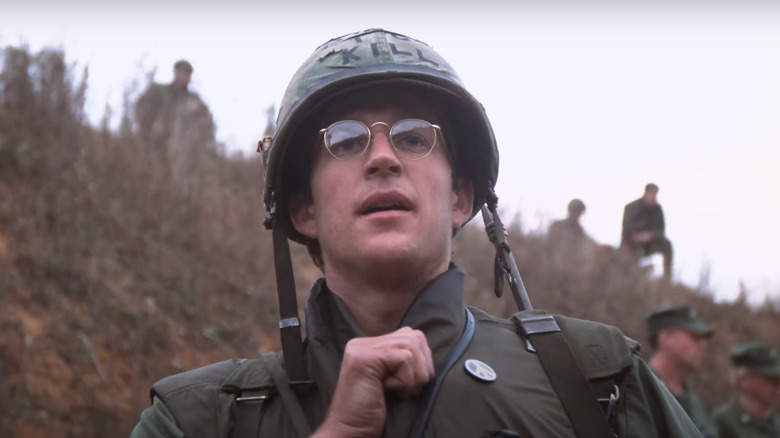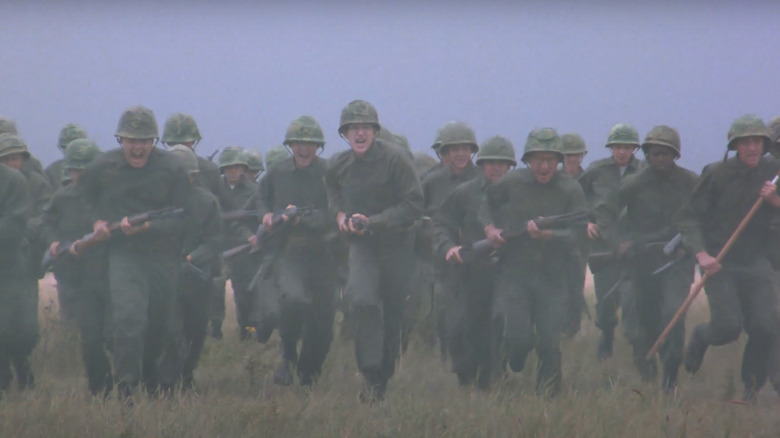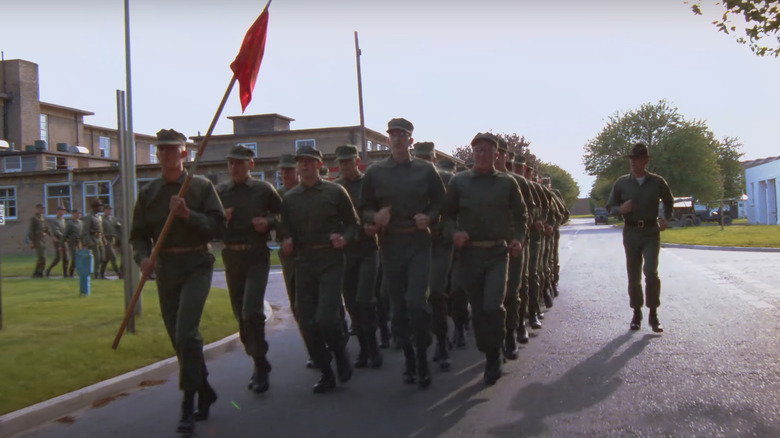Stanley Kubrick Used Full Metal Jacket's Casting Call As A Publicity Stunt
By the time Stanley Kubrick came to direct "Full Metal Jacket" in the mid-1980s, his legendary status had been well and truly established. At that point, most of his filmography was behind him. "Full Metal Jacket," released in 1987, would be his penultimate film, followed by "Eyes Wide Shut" in 1999 — the same year the director passed away. But Kubrick had long since ascended to a status in Hollywood that few other directors ever had or would reach. Naturally, actors were eager to be a part of his Vietnam War epic.
Kubrick, ever the informed and calculating artist, was well-aware of his reputation and took a characteristically unique approach to casting "Full Metal Jacket" by playing on that reputation. The director had always put the story first on whatever project he was working on, and as such was diligent about getting the right actors for his roles. As "Full Metal Jacket" star Matthew Modine once said of the director, "Stanley doesn't seem to be able to separate acting from life. You either are the character or you are not. It's not acting."
That was no different with his adaptation of Gus Hasford's "The Short-Timers." Kubrick was diligent about casting the right actors in leading roles, with Modine taking on the central role of Private JT "Joker" Davis supported by his friend Vincent D'Onofrio as Private Leonard "Gomer Pyle," and the former Marine, R. Lee Ermey, as the downright scary Gunnery Sergeant Hartman. But before those names were confirmed, the director sent out an international call for new faces to play the marines. As well as resulting in thousands of tapes to review, the stunt proved an effective marketing trick for his movie — just as Kubrick knew it would.
The Kubrick mystique
As related in John Baxter's "Stanley Kubrick: A Biography," from his country home in England's Hertfordshire, Kubrick let "wannabe actors do much of the work of casting for him [by telling] the world's press that he wanted audition tapes from anyone who felt able to play an 18-year-old Marine." The 1984 casting call came with typically specific Kubrickian instructions that demanded actors "stand against a plain background in jeans and a white T-shirt with a card showing their name and a contact number." The performers would the run through a three-minute scene before providing some information on their personal life and interests. Finally, they were instructed to hold up a sheet showing their name, contact details, age, and date of birth.
YouTube is littered with some of the audition tapes, including one legendary example by Mr. Brian Atene ("the finest actor in the lot!"). Word also got back to almost as fine an actor, Val Kilmer, who similarly made a tape and delivered it directly to Kubrick by traveling to the UK where production was set to get underway. Ultimately, neither Atene nor Kilmer would be cast. Instead, according to Vincent LoBrutto's Kubrick biography, Kubrick's team pored over "as many as 3,000 videotapes of prospective movie Marine grunts," before paring them down to around "800" for the director to review.
But the tapes themselves weren't the only thing Kubrick had in mind when sending out his casting call. As Baxter's book noted, "Kubrick played on his mystique" with the casting call and the resulting publicity for his war epic was "phenomenal. Everyone soon knew about 'Full Metal Jacket.'" It was only after the thousands of tapes came in that Kubrcik instructed his assistant, actor Leon Vitali, to "discreetly invite proposals from professionals."
It was about more than publicity
Stanley Kubrick's casting call can seem purely like a publicity stunt, considering he ultimately cast mostly-established pros in the lead roles. But it was more than just that. As Leon Vitali told The Guardian, "Stanley was just very, very open to someone being a good actor, and we'd try them out in different roles." Even after Matthew Modine had been cast, Vitali said he and Kubrick were still reviewing videotapes, adding, "It was like a jigsaw puzzle. We were three-quarters of the way into the film before we finished casting." Even once they turned to professional actors, those actors would be required to visit agencies to record their own taped audition, all at Kubrick's expense.
That said, there's no doubt the casting call did increase hype for the movie. As John Baxter noted, dozens of video companies were offering to film the audition tapes, including one in Boston which, at the height of the search, was churning out "30 pitches a day." As a result, Julian Senior, the Vice President of Advertising & Publicity for Warner Bros. Europe, was "inundated with tapes" and Kubrick had successfully created significant buzz for "Full Metal Jacket."
That was a good thing, too, considering even he was aware that after "Platoon," "Apocalypse Now," and "The Deer Hunter," audiences could easily be suffering from Vietnam War movie fatigue by the time his film debuted. Demonstrating a keen awareness of the media landscape in which he was working, Kubrick seemed to be constantly calculating behind the scenes of "Full Metal Jacket" — which turned out to be a bit much for the almost 60-year-old director. None of that seems to have impacted the final film, though, which, even without the great Brian Atene, remains one of, if not the best, Vietnam War movie ever made.


